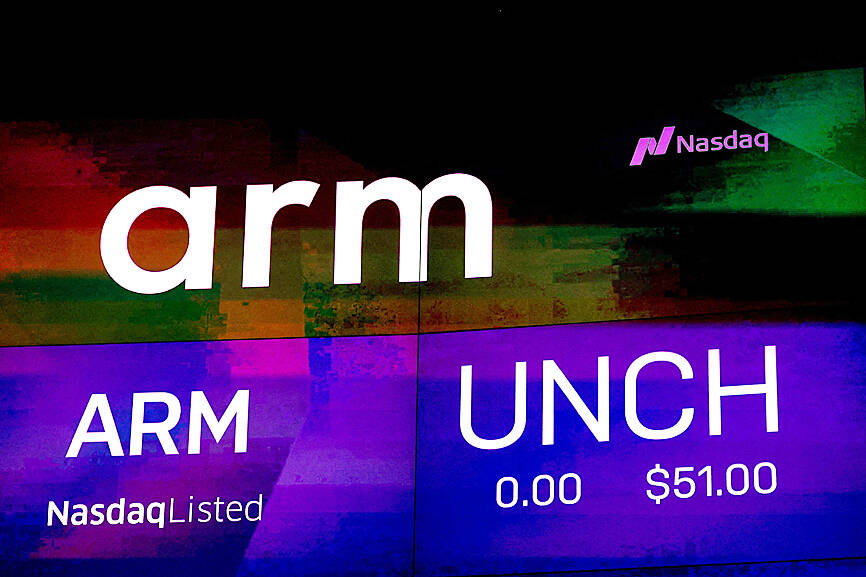Arm Holdings PLC on Wednesday forecast fiscal fourth-quarter sales and adjusted profit above Wall Street expectations as customers aim to design new chips for artificial intelligence (AI) work, generating higher royalties for the British technology firm.
Arm’s forecast ranges for its fourth quarter had midpoints of US$875 million for sales and US$0.30 per share for adjusted earnings, above estimates of US$780.3 million and U$$0.21 per share, LSEG data showed.
For the full fiscal year, Arm expects US$3.18 billion in revenue and adjusted earnings of US$1.22 per share, both above analysts’ estimates of US$3.05 billion and US$1.07 per share.

Photo: REUTERS
“We’re seeing more interest in newer designs and newer technologies by customers” due to interest in AI, Arm chief financial officer Jason Child said. “It’s real. Folks are actually buying and licensing that technology.”
For the fiscal third quarter, Arm reported sales of US$824 million and adjusted earnings of US$0.29 per share, topping Wall Street estimates of U$$761.6 million and US$0.25 per share.
Arm, which is still majority-owned by Japan’s Softbank Group Corp after a public listing last year, creates intellectual property that underlies most of the world’s smartphone chips.
The company has also expanded into laptops, where customers such as Qualcomm Inc and Nvidia Corp plan to use its technology for forthcoming chips, and data centers, where Microsoft Corp and Amazon.com Inc now offer Arm-based central processors to developers via their cloud computing businesses.
Arm makes money via licensing deals for its intellectual property and a royalty charged for each chip sold that uses its technology. The company’s US$75 billion valuation on just over US$3 billion in expected fiscal 2024 revenue — a multiple higher than any other firm in the chip industry — rests on its stated plan to obtain far higher royalties per chip than it has historically.
After a smartphone slump last year that caused Arm sales to contract, analysts expect Arm revenue to expand this year as consumers look to upgrade smartphones and laptops for new generative AI services such as chatbots.
Many of the chips in those devices will use the ninth generation of Arm’s core chip architecture, for which the company is charging higher royalty rates than previous versions.

Merida Industry Co (美利達) has seen signs of recovery in the US and European markets this year, as customers are gradually depleting their inventories, the bicycle maker told shareholders yesterday. Given robust growth in new orders at its Taiwanese factory, coupled with its subsidiaries’ improving performance, Merida said it remains confident about the bicycle market’s prospects and expects steady growth in its core business this year. CAUTION ON CHINA However, the company must handle the Chinese market with great caution, as sales of road bikes there have declined significantly, affecting its revenue and profitability, Merida said in a statement, adding that it would

i Gasoline and diesel prices at fuel stations are this week to rise NT$0.1 per liter, as tensions in the Middle East pushed crude oil prices higher last week, CPC Corp, Taiwan (台灣中油) and Formosa Petrochemical Corp (台塑石化) said yesterday. International crude oil prices last week rose for the third consecutive week due to an escalating conflict between Israel and Iran, as the market is concerned that the situation in the Middle East might affect crude oil supply, CPC and Formosa said in separate statements. Front-month Brent crude oil futures — the international oil benchmark — rose 3.75 percent to settle at US$77.01

RISING: Strong exports, and life insurance companies’ efforts to manage currency risks indicates the NT dollar would eventually pass the 29 level, an expert said The New Taiwan dollar yesterday rallied to its strongest in three years amid inflows to the nation’s stock market and broad-based weakness in the US dollar. Exporter sales of the US currency and a repatriation of funds from local asset managers also played a role, said two traders, who asked not to be identified as they were not authorized to speak publicly. State-owned banks were seen buying the greenback yesterday, but only at a moderate scale, the traders said. The local currency gained 0.77 percent, outperforming almost all of its Asian peers, to close at NT$29.165 per US dollar in Taipei trading yesterday. The

RECORD LOW: Global firms’ increased inventories, tariff disputes not yet impacting Taiwan and new graduates not yet entering the market contributed to the decrease Taiwan’s unemployment rate last month dropped to 3.3 percent, the lowest for the month in 25 years, as strong exports and resilient domestic demand boosted hiring across various sectors, the Directorate-General of Budget, Accounting and Statistics (DGBAS) said yesterday. After seasonal adjustments, the jobless rate eased to 3.34 percent, the best performance in 24 years, suggesting a stable labor market, although a mild increase is expected with the graduation season from this month through August, the statistics agency said. “Potential shocks from tariff disputes between the US and China have yet to affect Taiwan’s job market,” Census Department Deputy Director Tan Wen-ling